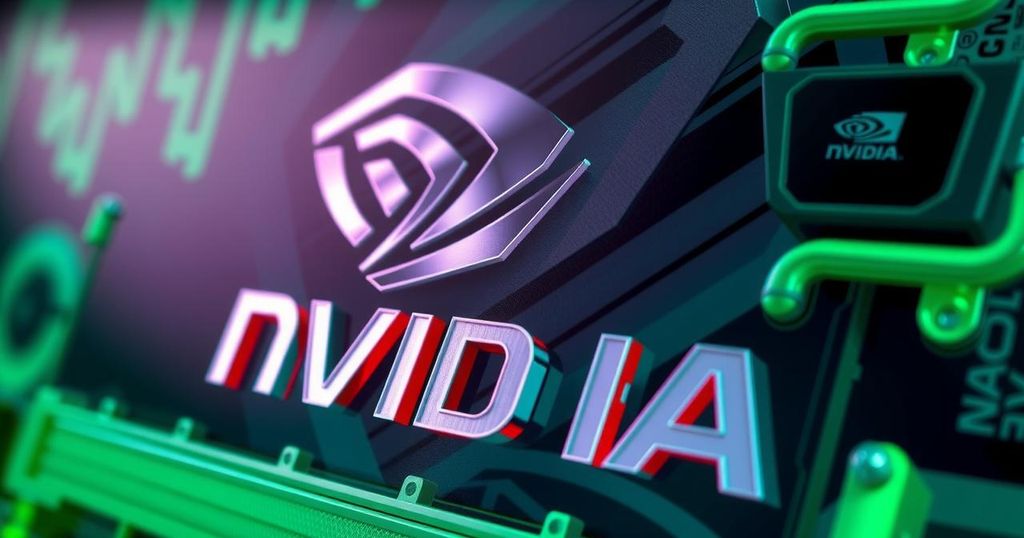Economy
Politics
APPLE, ASIA, CALIFORNIA, CHINA, CUBA, DATA CENTERS, DOW JONES INDUSTRIAL AVERAGE, FACTSET, INTEL, INVESTING, INVESTMENTS, MELLANOX, MEXICO, MICROSOFT, NORTH AMERICA, NVIDIA, SANTA CLARA, STOCK MARKET, STOCK PERFORMANCE, TAIWAN SEMICONDUCTOR MANUFACTURING CO, U. S, UNITED STATES
Dante Raeburn
Nvidia Shares Decline Amid China’s Antitrust Investigation
Shares of Nvidia dropped by 2.5% following the announcement of a Chinese investigation into possible anti-monopoly violations related to its acquisition of Mellanox Technologies. Nvidia’s booming revenue, primarily driven by demand for AI technologies, raises concerns over market dominance. The investigation adds to similar scrutiny from U.S. authorities, reflecting intensifying regulatory pressures on technology firms.
In the early hours of Monday, shares of Nvidia experienced a notable decline following the announcement by Chinese regulators that they are initiating an investigation into the company for potential breaches of anti-monopoly laws. This inquiry appears to center around Nvidia’s $6.9 billion acquisition of Mellanox Technologies in 2019. As a result, Nvidia’s stock fell by 2.5%, dipping below $140 per share.
Nvidia has positioned itself as a key indicator of artificial intelligence market demand, achieving significant market capitalization driven by substantial investments from technology firms in its chips and data center solutions required for AI development and operation. The company’s shares have surged nearly threefold this year, with revenue and profits soaring due to rising AI demand. According to FactSet, approximately 16% of Nvidia’s revenue can be attributed to China, making it one of their largest markets outside of the United States.
In its most recent earnings report, Nvidia announced revenue of $35.08 billion, a remarkable 94% increase from the previous year’s $18.12 billion, while quarterly earnings reached $19.31 billion. However, the report did not delineate revenue generated specifically from China. Nvidia’s market value soared to $3.5 trillion, temporarily surpassing Microsoft and overtaking Apple as the world’s most valuable company. The company is credited with revolutionizing the PC gaming industry with its graphics processor chip invention in 1999.
Last month, Nvidia replaced Intel on the Dow Jones Industrial Average, marking the end of Intel’s 25-year tenure on the index. Notably, Nvidia does not manufacture its chips but relies strongly on Taiwan Semiconductor Manufacturing Company (TSMC), a competitor of Intel. This examination by Chinese authorities follows earlier reports indicating that the U.S. Justice Department is also investigating similar allegations regarding Nvidia’s potential market dominance abuse, including allegations that the company imposes penalties on customers who procure products from competing firms.
The recent investigation initiated by Chinese regulators against Nvidia highlights the growing scrutiny faced by major corporations in the context of anti-monopoly laws. Nvidia has seen tremendous growth in recent years, particularly due to the escalating demand for artificial intelligence technologies. The company’s position in the market is significant, with a considerable share of its revenue generated from China, which stands as a crucial market for its operations. This investigation signals a tightening of regulatory oversight within the rapidly evolving tech sector, particularly regarding market competition and fair trade practices.
In conclusion, Nvidia’s recent decline in stock value is a direct consequence of the antitrust investigation announced by Chinese authorities, focusing on the company’s acquisition strategies and market dominance. With a significant portion of its revenue coming from China and its status as a leader in AI technology, Nvidia’s future may be impacted by both domestic and international regulatory pressures. This investigation reflects a broader scrutiny of major tech companies as they navigate complex market dynamics and regulatory landscapes.
Original Source: abcnews.go.com








Post Comment